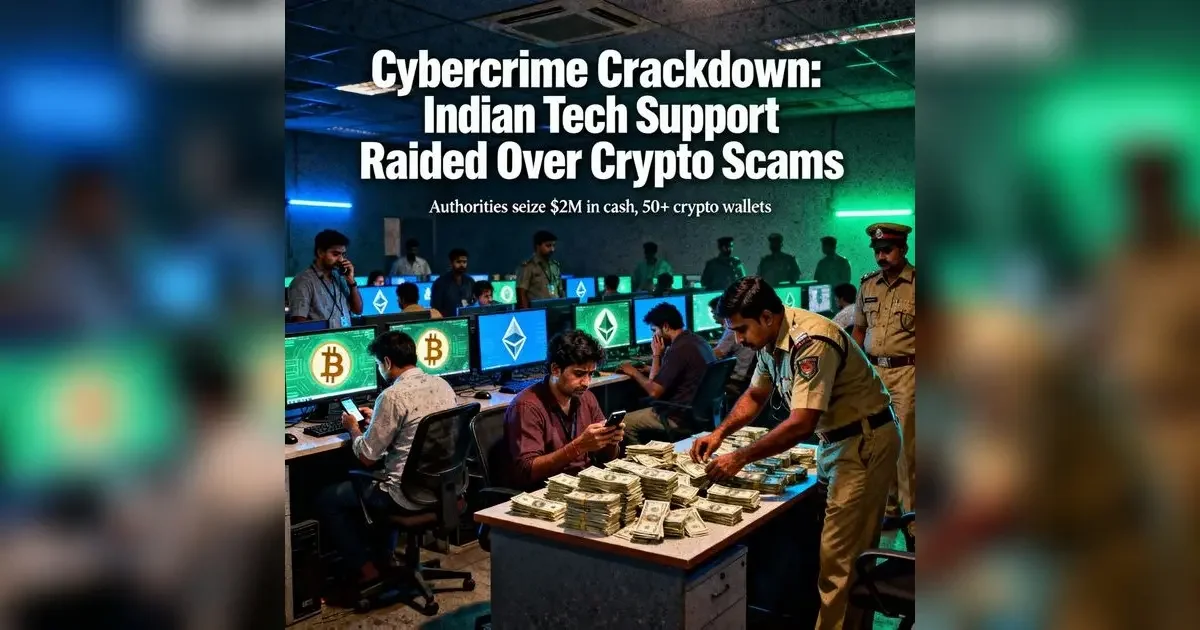The Tech Scam Virus: Why Raids and Busts Won't Fix India's Biggest IT Problem
Let’s be honest. We’ve all heard about it. That shady call center in a dusty lane of some Tier-2 city, where youngsters with fake American accents are trying to sell antivirus software to a terrified grandmother in Ohio. It's been a punchline for years. A bit of an embarrassment we quietly sweep under the rug.
But here’s the thing. It’s not a small-time jugaad anymore. It’s a full-blown, multi-crore industry. And the recent wave of raids by the Enforcement Directorate (ED) isn't just another news headline. It's peeling back the curtain on a sophisticated criminal enterprise that has evolved. The game has changed, and it’s now powered by cryptocurrency.
The Same Old Scam, Now on Steroids
The playbook is deceptively simple and brutally effective.
- The Scare: A pop-up ad shrieks, "Your computer is infected! All your data, bank details, and photos will be stolen!" Or you get a call from someone claiming to be from "Microsoft" or "Amazon Support."
- The "Help": A friendly, concerned voice guides you to give them remote access to your device to "diagnose" the non-existent problem. They’ll show you a bunch of scary-looking command prompts and system files, claiming it's all evidence of a deadly virus.
- The Squeeze: They quote you a few hundred dollars to "fix" it. For people panicking about losing everything, it seems like a small price to pay.
For years, that money came through wire transfers or gift cards—messy, traceable, and a pain to launder. But scammers are smart. They adapt. Why deal with banks and their annoying questions when you can just dive into the murky, unregulated ocean of crypto?
The proceeds from these scams are now instantly converted into Bitcoin, Ethereum, or some other cryptocurrency. The money is then bounced around multiple digital wallets, split, and mixed, making it a nightmare for authorities to trace. It's the 21st-century version of a hawala network—instant, global, and almost invisible. This crypto twist is why the ED is now kicking down doors. It's not just a tech support scam; it's a massive money-laundering operation.
Why Raids Are Just a Band-Aid on a Bullet Wound
It feels good to see the news flashes: "ED raids multiple locations," "Mastermind of multi-crore scam arrested." It’s a win, right?
Sort of. But it's like celebrating killing a few mosquitoes while ignoring the swamp they breed in. Busting one call center is easy. Ten more pop up the next week. The real problem isn't the individual scammer; it's the ecosystem that creates them.
Think about it. We have a massive population of young, educated, and tech-savvy people. But we don't have enough legitimate, well-paying jobs for them. When you offer a 22-year-old with a college degree a choice between a ₹15,000-a-month data entry job and a ₹1,00,000-a-month "sales" job that just requires a good accent and a flexible moral compass, what do you think many will choose?
This isn't an excuse; it's a diagnosis. These scam centers thrive in a culture of high unemployment, desperation, and a bizarre glorification of "hustle" at any cost.
The bigger, unspoken damage is to India's reputation. We are a global IT powerhouse. Millions of Indians work legitimately in the tech and support industries, doing brilliant, honest work. But every time a scam like this makes international news, it tars everyone with the same brush. It makes the job of every genuine Indian professional that much harder. It reinforces a stereotype we’ve been fighting for decades.
So, What's the Real Antivirus?
The real fix isn't more raids. The real fix is brutally difficult and painfully slow.
It’s about creating an economy with enough opportunities that young people don't see scamming as their best career option. It's about building a culture where we value ethical work over easy money. It's about digital literacy—not just for the victims abroad, but for the potential perpetrators here, so they understand the real-world consequences of their actions beyond a fat paycheck.
These raids are necessary, but they are a symptom of the disease, not the cure. The real virus isn't on a computer in America; it's in the system that makes a fraudulent call center a viable career path in India. And until we fix that, we're just stuck in an endless loop of playing whack-a-mole with criminals.
